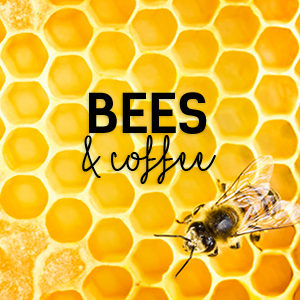The next time you’re enjoying a good cup of coffee, thank the bees. Yes. The bees. Every cappuccino, every latte, every short black has one thing in common, apart from the actual coffee: they require bees to get from the plant to your mouth.
And there’s a big problem with that. If you haven’t heard lately, bees are dying in big numbers and if that trend continues, you might start experiencing a coffee shortage worldwide. That’s a lot of information to take in. Let’s back up a second.
Why are bees so important for coffee?
As you might remember from primary school, bees are pollinators. They gather pollen from one flower or plant and take it to another. This isn’t just so they can go back to their hives and create delicious honey – the pollination of other plants means they can grow better. That’s exactly the case with coffee. The flowers that grow from coffee plants are rich with sugar and high quality nectar. That’s a gold mine for bees, who then gather the pollen to take back to their hives. As a result, coffee plantations can grow in yield due to the effects of this cross-pollination.
Pretty simple: the more bees you have visiting a coffee plantation, the more coffee you’re going to get.
If you’re interested, you should check out this study that found coffee plantations visited by bees end up growing much more plentiful crops.
So, bees help coffee. Pretty simple, right? Except it isn’t. Because if you haven’t noticed, bees are dying around the world in record numbers. And like most of the other animal-related deaths and phenomena occurring around the world, we have our old friend climate change to thank. (Which is also posing some threats to coffee growth as well.)
For about the past decade, bees have been dying at a huge rate. In the United States alone, bees are dying at a rate of 30% per year with economic damage in the billions. It was pretty freaky, actually. A few years ago there were all these stories of bees dying and scientists just not figuring out why. It’s like something out of a dystopian science-fiction movie. But we have a better idea now.
Over at Mother Jones there’s a great article that delves into why bees are dying: insecticides. However, new research has also shown bumblebee hives have been dying since the 1970s. Bee hives are dying in Europe, Canada and elsewhere.
But there’s actually some hope. Bees in other parts of the world are surprisingly resilient. In fact, African bees – which live in sub-tropical areas – are more aggressive and resilient to insecticides. Scientists are already working on ways African bees can help those in the United States and Europe. So, you don’t have to worry about your coffee plants going bust just yet. But keep an eye on things – if the bees start disappearing, your coffee could be next.
Written by James February 28, 2017
Original article from: blog.beanhunter.com/bees-ingredient-coffee-needs/



















